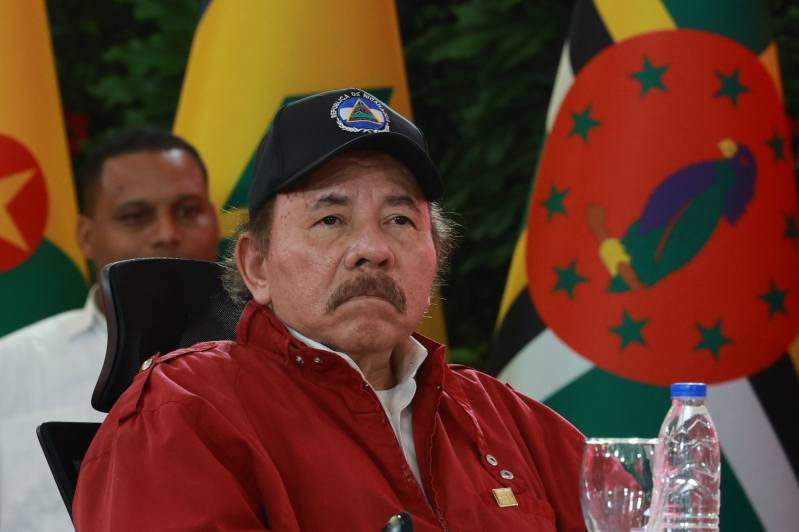
The sharp increase in attacks on Christians in Nicaragua the past two years included increased targeting of evangelical churches, according to a report by a European advocacy group devoted to human rights.
The regime of Nicaraguan President Daniel Ortega since 2018 has openly waged war on Christians in retaliation for peaceful opposition to a social security reform, stated the report by the Strasbourg, France-based European Centre for Law and Justice (ECLJ).
“It is important to note that in addition to the repression against the Catholic Church in recent years, there is now increasing repression targeting the evangelical church and other religious denominations,” the ECLJ stated in the report, “The Persecution of Christians in Nicaragua 2018-2024,” issued earlier this month. “Although initially these did not seem to be in the government’s crosshairs, it is now clear that they are now part of Ortega’s repressive strategy.”
More than 100 attacks against evangelical bodies have been recorded, according to the report, adding that such data are approximations as some crimes go unreported out of fear or hope that repression will stop.
“Unfortunately, the attacks continue to occur with the same intensity,” the report stated. “The number of attacks in the first half of 2024, already equivalent to that of the whole of 2018, underlines the increasing seriousness of these acts.”
Despite Nicaragua’s constitutional and international treat commitments to respect basic rights such as freedom of religion, Nicaragua persecutes Christians, the report stated.
“Added to this is violence, lack of due process and fair trial, and arbitrary detention,” it stated. “Nicaragua is thus guilty of crimes against humanity against Christians, accusing them of appearing critical, adversarial, or not loyal enough to the government.”
Dozens of Protestant, Catholic and other churches have had their legal status revoked, as have charitable organizations.
“The Nicaraguan government seeks to monopolize the management of social assistance and international cooperation, trying to transform the state into the sole administrator of this type of organizations through state institutions,” the report stated.
Among national evangelical groups targeted was the Asociación Misión Cristiana Verbo Divino, whose legal status was revoked on May 19, 2023. Over nearly three decades it managed 27 churches as well as several humanitarian projects, including the Casa Bernabé orphanage.
The government on Jan. 16, 2024 also dissolved several organizations and churches of other Christian denominations, such as the Asociación Misión Pentecostés Jehovah Proveerá, the Asociación Misión Apostólica Evangelística y Profética, the Fundación Iglesia Familiar Nueva Restauración and the Asociación Misiones Trasmundiales de Nicaragua.
As of December 2023, the legal status of the Puerta de la Montaña (Mountain Gateway) Church, the Asociación Ministerio Internacional Berea (Pentecostal) and the Asociación Ministerio Internacional Creciendo en Gracia was also revoked, according to the report. Among 169 civil society organizations whose legal status was revoked on Aug. 29, 2024 was the Association of Missionaries in Nicaragua, founded by Mother Teresa of Calcutta, and the Nicaraguan Evangelical Alliance.
“These cancellations came despite the fact that these organizations, although very socially active and capable of mobilizing large numbers of followers in religious demonstrations, had not issued any direct criticism of the government,” the report stated. “Their dissolution illustrates the Ortega regime’s desire to control all forms of social influence, including that of religious groups.”
Evangelical organizations such as Christian Aid, along with international faith-based associations such as the Catholic Agency for Overseas Development (CAFOD) and Caritas International, have also lost their legal status, “depriving Nicaraguans of the humanitarian aid they provided.”
“A significant portion of these organizations worked for health, education and assistance to the most vulnerable,” the report stated. “Their absence leaves a void in assistance to the most destitute.”
While the government has banned many Catholic manifestations of faith such as processions, the U.N. Human Rights Council’s Human Rights Group of Experts on Nicaragua also has noted restrictions on the public activities of other Christian denominations, especially since 2022. In September of that year, the National Council of Pastors of Nicaragua in Nagarote, León Department, issued a statement informing evangelical churches of the cancellation of the Bible Day festivities there.
“This decision, justified by instructions received from local authorities, cited reasons related to the safety of the participants,” the ECLJ report stated. “The National Police have also repeatedly prevented entire groups from celebrating religious ceremonies.”
Police on Dec. 24, 2022, stopped an Assemblies of God church in a rural area from celebrating Christmas with a Bible study followed by games and a meal for a group of approximately 20 children, the report stated.
“The police have since prohibited the church from holding any religious activities involving children,” it stated.
In March and July 2023, officials denied permission to a second Assemblies of God church in the Autonomous Region of the South Caribbean Coast to hold special religious events.
“For the past two years, this church has not been allowed to hold religious events,” according to the report. “While services used to be held three times a week, the government now allows only one 45-minute meeting each Sunday. The pastor reported that many church members have stopped attending for fear of reprisals.”
Such bans are a result of a government aim to prevent any social mobilization by churches, perceived as a threat to the total control it seeks to exercise over all spheres of society, the report stated.
“These persecutions and bans constitute a serious attack on religious freedom, limiting the fundamental right of Christian communities to practice their faith freely,” it reported.
The regime began intensifying attacks initially on the Catholic Church in 2018 after it helped protestors against social security reform who were brutally repressed. Ortega since then has accused the Catholic Church of conspiring against his government, arrested priests, confiscated church property and expelled other clergy along with nuns.
Human rights defender Martha Patricia Molina in a July 2024 report documented 870 attacks against the Catholic Church since April 2018. At least 92 of these attacks were carried out in 2018, decreasing to 88 in 2019, 64 in 2020 and 56 in 2021, but “an alarming increase was observed in 2022 with 171 attacks, followed by a peak in 2023 with 307 attacks,” the ECLJ report stated.
In the first half of 2024, 92 attacks had already been reported.
“These data highlight a clear trend of escalating violence against the Catholic Church in Nicaragua, particularly since 2022, the report noted. “Although the number of attacks temporarily decreased between 2019 and 2021, the sharp increase in attacks in 2022 and 2023 illustrates a significant intensification of the repression.”
Jan. 27, 2025 correction: An earlier version of this story quoted the ECLJ report as stating that Compassion International had lost its legal status in Nicaragua, but it has not lost its legal status and is fully operational in the country.





